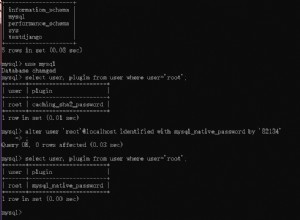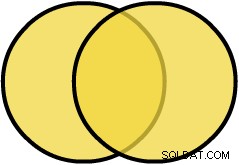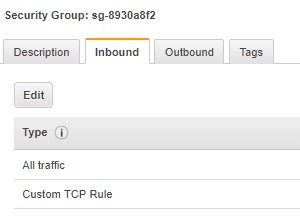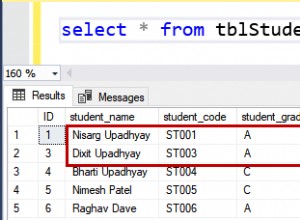Para intervalos de 15 minutos:
with i as (
select cf.tagindex, min(dateandtime) dateandtime
from contfloattable cf
group by
floor(extract(epoch from dateandtime) / 60 / 15),
cf.tagindex
)
select cf.dateandtime, cf."Val", cf.status, t.tagname
from
contfloattable cf
inner join
conttagtable t on cf.tagindex = t.tagindex
inner join
i on i.tagindex = cf.tagindex and i.dateandtime = cf.dateandtime
order by cf.dateandtime, t.tagname
Muestre el resultado de explicación para esta consulta (si funciona) para que podamos intentar optimizar. Puedes publicarlo en esta respuesta.
Explicar salida
"Sort (cost=15102462177.06..15263487805.24 rows=64410251271 width=57)"
" Sort Key: cf.dateandtime, t.tagname"
" CTE i"
" -> HashAggregate (cost=49093252.56..49481978.32 rows=19436288 width=12)"
" -> Seq Scan on contfloattable cf (cost=0.00..38528881.68 rows=1408582784 width=12)"
" -> Hash Join (cost=270117658.06..1067549320.69 rows=64410251271 width=57)"
" Hash Cond: (cf.tagindex = t.tagindex)"
" -> Merge Join (cost=270117116.39..298434544.23 rows=1408582784 width=25)"
" Merge Cond: ((i.tagindex = cf.tagindex) AND (i.dateandtime = cf.dateandtime))"
" -> Sort (cost=2741707.02..2790297.74 rows=19436288 width=12)"
" Sort Key: i.tagindex, i.dateandtime"
" -> CTE Scan on i (cost=0.00..388725.76 rows=19436288 width=12)"
" -> Materialize (cost=267375409.37..274418323.29 rows=1408582784 width=21)"
" -> Sort (cost=267375409.37..270896866.33 rows=1408582784 width=21)"
" Sort Key: cf.tagindex, cf.dateandtime"
" -> Seq Scan on contfloattable cf (cost=0.00..24443053.84 rows=1408582784 width=21)"
" -> Hash (cost=335.74..335.74 rows=16474 width=44)"
" -> Seq Scan on conttagtable t (cost=0.00..335.74 rows=16474 width=44)"
Parece que necesitas este índice:
create index cf_tag_datetime on contfloattable (tagindex, dateandtime)
Ejecutar analyze después de crearlo. Ahora observe que cualquier índice en una tabla grande tendrá un impacto significativo en el rendimiento de los cambios de datos (insertar, etc.), ya que deberá actualizarse en cada cambio.
Actualizar
Agregué el índice cf_tag_datetime (tagindex,dateandtime) y aquí está la nueva explicación:
"Sort (cost=15349296514.90..15512953953.25 rows=65462975340 width=57)"
" Sort Key: cf.dateandtime, t.tagname"
" CTE i"
" -> HashAggregate (cost=49093252.56..49490287.76 rows=19851760 width=12)"
" -> Seq Scan on contfloattable cf (cost=0.00..38528881.68 rows=1408582784 width=12)"
" -> Hash Join (cost=270179293.86..1078141313.22 rows=65462975340 width=57)"
" Hash Cond: (cf.tagindex = t.tagindex)"
" -> Merge Join (cost=270178752.20..298499296.08 rows=1408582784 width=25)"
" Merge Cond: ((i.tagindex = cf.tagindex) AND (i.dateandtime = cf.dateandtime))"
" -> Sort (cost=2803342.82..2852972.22 rows=19851760 width=12)"
" Sort Key: i.tagindex, i.dateandtime"
" -> CTE Scan on i (cost=0.00..397035.20 rows=19851760 width=12)"
" -> Materialize (cost=267375409.37..274418323.29 rows=1408582784 width=21)"
" -> Sort (cost=267375409.37..270896866.33 rows=1408582784 width=21)"
" Sort Key: cf.tagindex, cf.dateandtime"
" -> Seq Scan on contfloattable cf (cost=0.00..24443053.84 rows=1408582784 width=21)"
" -> Hash (cost=335.74..335.74 rows=16474 width=44)"
" -> Seq Scan on conttagtable t (cost=0.00..335.74 rows=16474 width=44)"
Parece haber subido en el tiempo :( Sin embargo, si elimino la cláusula order by (no es exactamente lo que necesito, pero funcionaría), esto es lo que sucede, una gran reducción:
"Hash Join (cost=319669581.62..1127631600.98 rows=65462975340 width=57)"
" Hash Cond: (cf.tagindex = t.tagindex)"
" CTE i"
" -> HashAggregate (cost=49093252.56..49490287.76 rows=19851760 width=12)"
" -> Seq Scan on contfloattable cf (cost=0.00..38528881.68 rows=1408582784 width=12)"
" -> Merge Join (cost=270178752.20..298499296.08 rows=1408582784 width=25)"
" Merge Cond: ((i.tagindex = cf.tagindex) AND (i.dateandtime = cf.dateandtime))"
" -> Sort (cost=2803342.82..2852972.22 rows=19851760 width=12)"
" Sort Key: i.tagindex, i.dateandtime"
" -> CTE Scan on i (cost=0.00..397035.20 rows=19851760 width=12)"
" -> Materialize (cost=267375409.37..274418323.29 rows=1408582784 width=21)"
" -> Sort (cost=267375409.37..270896866.33 rows=1408582784 width=21)"
" Sort Key: cf.tagindex, cf.dateandtime"
" -> Seq Scan on contfloattable cf (cost=0.00..24443053.84 rows=1408582784 width=21)"
" -> Hash (cost=335.74..335.74 rows=16474 width=44)"
" -> Seq Scan on conttagtable t (cost=0.00..335.74 rows=16474 width=44)"
Todavía no he probado este índice... aunque lo haré. en espera.
Ahora, viéndolo de nuevo, creo que el índice inverso podría ser aún mejor, ya que se puede usar no solo en Merge Join pero también en el Sort final :
create index cf_tag_datetime on contfloattable (dateandtime, tagindex)




